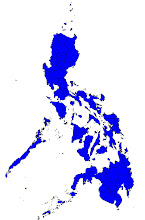by Doris Dumlao (Philippine Daily Inquirer)
http://newsinfo.inquirer.net/inquirerheadlines/nation/view/20100311-257936/Business-jittery-that-failure-of-election-real-riskMANILA, Philippines—The possibility amid recent power outages of the first national computerized elections failing to produce a president, whether real or imagined, is sending chills to the financial community.
In an economic briefing Wednesday, Roland Avante, Sterling Bank Asia treasurer, said that foreign analysts were apprehensive that if the results of the May 10 balloting were “tainted, it can create political instability.”
The treasury veteran and former president of the Money Market Association of the Philippines warned that this could affect the performance of the economy and potentially push away investors, many of whom had stayed away for years.
Avante said jitters were rising that a failure of elections was a real risk.
“To a lot of Filipinos, maybe 80 percent haven’t thought there will be failure of elections and that goes back even to the discussion of why the appointment of a new Justice Secretary is important and why it is important at this particular point in time,” he said.
If the elections would be sabotaged, Avante said “all the gains that the country has made in the last few years can all go to waste.”
“Political instability is one thing that we don’t need,” he said, noting that these uncertainties were among the reasons why global investors preferred global bonds issued by Indonesia over those issued by the Philippines.
Such concerns have intensified especially amid recent power outages, which have been worse in areas outside Metro Manila.
“Mindanao is worse and we all know that Mindanao for the past few elections have been crucial—can make a critical, decisive (sway) or clincher in an election,” Avante said. “The power outage can hurt the credibility of the elections.”
These concerns were also raised by New York-based think tank Global Source in a March 6 research titled “The Next 100 Days.”
The commentary written by Filipino economists Romeo Bernardo and Marie-Christine Tang said that while the basic assumption was still an orderly transfer of power, they would continue to “keep an eye out for the dreaded election failure scenario.”
Lingering doubts
“While the Comelec (Commission on Elections) has been steadfast in defending the new system and has continuously dispelled talks of possible election failure, many fear that lingering doubts about the integrity of the new system would expose electoral results to challenge from losing parties, a risk which multiplied several times over could potentially whittle down public confidence and lead to failure of elections,” the research said.
With more than 60 days to go before the elections, Global Source said the presidential contest between the front-runners—Senators Benigno Aquino III and Manny Villar—still looked “too close to call.”
“An expected tight race, where narrow margins require a wider count to determine the winner, has increased anxieties over possible glitches in the Comelec’s computerization program,” Global Source said.
Comelec’s bad reputation
Both an administrative and a quasi-judicial body that conducts elections and handles electoral disputes, Global Source noted that the institution had seen the Comelec’s reputation badly smirched by allegations of irregularities in the counting of votes involving one of its commissioners in the last presidential election in 2004.
“The promise of automation to deliver results by the third day has wide appeal in a country where past elections required voters to wait as long as 43 days for the winner to be proclaimed. Still, many have early on expressed misgivings about Comelec’s ability to carry out a nationwide automation project in the more than 7,000-island archipelago where far-flung areas are deprived of even basic telecommunication services,” Global Source said.
Trust issues aside, it cited concerns that the poll body was given a tight timetable to carry out its computerization project especially as the budget for the project was approved only in late March 2009.
Delays
Global Source said delays from the start, such as the delivery of poll machines that had shortened preparation for other activities, like field testing, ballot printing, training and education plus risks in the transmission of data, had heightened worries that the Comelec would be relying on a less-than-perfect system. Only 75 percent of the voting precincts are electronically connected.
It noted that several quarters, including a prominent business group, the Management Association of the Philippines, had also raised concerns about transparency and auditability of the automated system.
Political analysts have reasoned that given the emerging tight race, a partial failure in certain areas could result in a genuine inability to proclaim a winner, Global Source said.
“In many people’s minds, the risk of partial failure went up following recent power outages especially in Mindanao, where about a fourth of the voting population resides and where the El Niño dry spell has reduced capacities of hydroelectric plants,” Global Source said.
Fear over outages
The fear is that power supply in Mindanao will be inadequate come election day, it said.
But assuming that elections push through, Global Source is optimistic that the Philippines will continue to be market-friendly.
“In particular, we have high hopes that either of the two presidential front-runners will prioritize fiscal sustainability issues if he wins,” it said.




No comments:
Post a Comment